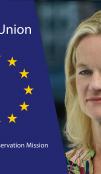The question of all questions and why the answer can’t be popular

“The question about our findings is valid and important”, says Chief Observer Viola von Cramon. “That’s why we are here in Iraq: to assess the quality of the electoral process. But we can’t answer this question before the election day. If the EU EOM replies, the EU EOM would run the risk of violating one of its core principles: not to interfere in the electoral process.”
“This principle is vested in a strict code of conduct. It was endorsed in 2005 by 21 of the most respected observer organisations across the world and is a binding foundation for European Union election observation missions”, explains von Cramon.
The document says: “International election observation should, when possible, offer recommendations for improving the integrity and effectiveness of electoral and related processes, while not interfering in and thus hindering such processes.”
“We as the EU EOM fully understand the frustration when we don’t comment. People expect us to say something. They often expect us to be the referee who decides what is right and what is wrong”, says von Cramon. “But we are only observers. We do not supervise or give instructions. We are also impartial and independent and don’t represent anyone’s interest”.
“To make it more transparent let's use the simple example of a football match” says the Chief Observer. ”There are two teams on the field, and there is one referee plus his assistants. The teams are the candidates and parties, and the referee is the electoral commission, the courts and other regulatory bodies. And then there are the people on the stands. Amongst them: the EU election observers”, explains von Cramon. “We are invited to observe”.
“If the spectators would all the sudden run onto the field, to tell the teams how to play or to correct decisions by the referee that would be a major disruption of the game. It is much more appropriate to analyse after match is over, to report and to give recommendations - for the teams and the referee, suggesting how to play a better match next time.”
And that’s what the EU EOM does: “EU observers publish a preliminary statement two days after the elections in a press conference in Baghdad. This statement reflects the most important findings and conclusions on the electoral process up to this day. It is called preliminary because the electoral process is not yet over”, says the Chief Observer. A final report, with recommendations, will be published about two months later. This report is also public and the recommendations will be discussed with all relevant stakeholders in the electoral process.
The question remains though: what is the added value EU observers have in the current parliamentary elections? “For genuine democratic elections its critical that people can choose freely their future representatives in parliament and leaders” stresses von Cramon. “The presence of an international observation mission, following closely all aspects of the electoral process across the country, can deter fraud and intimidation and hence contribute to the trust of citizens in the elections. The more voters come out to vote, the better the results will reflect the will of the people”, adds the Chief Observer.





